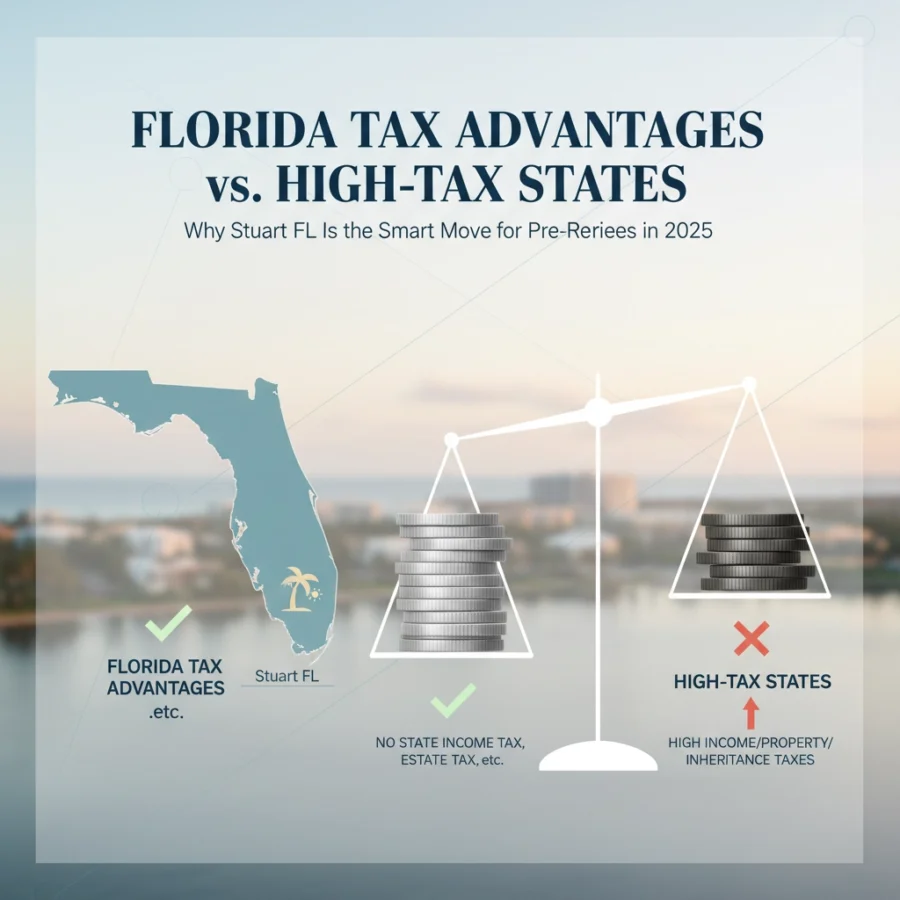As a pre-retiree, you're likely watching every dollar and planning strategically for your golden years. If you're still living in a high-tax state like New York, California, or New Jersey, you might be unknowingly hemorrhaging thousands of dollars annually that could otherwise strengthen your retirement nest egg. Florida: and specifically the Stuart area on the beautiful Treasure Coast: offers a compelling tax environment that could dramatically improve your financial outlook.
The Florida Tax Advantage: More Than Just No Income Tax
While most people know Florida doesn't have a state income tax, the tax advantages run much deeper than that single benefit. Florida eliminates multiple layers of taxation that high-tax states impose on retirees and pre-retirees alike.
Here's what Florida doesn't tax that other states do:
- Personal income tax (obviously)
- Social Security benefits
- Pension distributions
- 401(k) and IRA withdrawals
- Inheritance taxes
- Estate taxes
This comprehensive approach to tax policy means retirees can save between $1,200 and $3,500 annually compared to high-tax states. Over a 25-year retirement, that's potentially $87,500 in additional wealth preservation: money that stays in your pocket instead of going to state coffers.

The 2025-2026 Federal Tax Game Changer
Recent federal legislation has created an even more compelling case for Florida residency. The new federal senior deduction provides $6,000 for individuals and $12,000 for married couples, stacking on top of existing deductions starting in 2026.
This change will increase the percentage of seniors owing no federal income tax on Social Security from 64% to 88%: affecting 14.2 million retirees nationally. In Florida specifically, approximately 4.8 million seniors are expected to benefit from this new tax-free status. When you combine these federal benefits with Florida's state-level advantages, the savings become substantial.
The federal changes also quadruple the SALT deduction cap from $10,000 to $40,000, though this matters less for Florida residents since we don't pay state income taxes anyway. It's just another reminder of how Florida's tax structure insulates residents from the complexities and costs that burden residents of high-tax states.
Why Stuart FL Stands Out on the Treasure Coast
Stuart and the surrounding Treasure Coast region offer unique advantages even within Florida's favorable tax environment. The area maintains lower property tax rates compared to South Florida counties, while still providing access to world-class amenities and healthcare.
For retirement planning Stuart FL purposes, the region's cost of living remains more reasonable than Miami-Dade or Broward counties, while still offering sophisticated financial services infrastructure. As a financial advisor Stuart FL, I've seen clients save significantly more by relocating to our area rather than other Florida retirement destinations.
The Martin County property tax rate averages around 1.1% compared to the national average of 1.2%. For retirees, Florida also offers additional property tax exemptions, including homestead exemptions that can reduce taxable property value by up to $50,000.
Real Numbers: High-Tax State Comparison
Let's look at concrete examples of what pre-retirees face in high-tax states versus Stuart FL:
California resident earning $75,000 in pre-retirement income:
- State income tax: approximately $3,500-$4,500 annually
- Social Security taxation: up to 13.3% state tax on benefits
- Property taxes: often 0.75-1.25% but on much higher home values
New York resident with similar income:
- State income tax: approximately $3,000-$4,000 annually
- Local income taxes in NYC: additional 3.876%
- Property taxes: among the highest nationally at 1.69% average
Stuart FL resident with identical financial profile:
- State income tax: $0
- Tax on Social Security: $0
- Property tax: typically lower effective rate due to homestead exemptions
The savings compound significantly when you factor in years of accumulation before and during retirement.

Strategic Timing: Why Pre-Retirees Should Move Now
The optimal strategy isn't waiting until retirement to relocate: it's establishing Florida residency while you're still earning significant income. This approach allows you to:
- Capture immediate tax savings on your final working years' income
- Establish residency requirements well before retirement
- Build relationships with Florida-based financial professionals
- Understand the local market before becoming dependent on fixed income
For wealth management Treasure Coast planning, this early transition period provides flexibility that pure retirees lack. You can optimize your tax situation while still maintaining earning capacity, rather than scrambling to relocate after retirement income has already begun.
Beyond Taxes: The Complete Financial Picture
While taxes represent the most significant advantage, Stuart FL offers additional financial benefits:
Healthcare Costs: Florida's competitive healthcare market often provides more options and competitive pricing than high-tax states.
Housing Market: While Florida real estate has appreciated, Stuart and the Treasure Coast still offer better value propositions than comparable coastal areas in high-tax states.
Insurance Considerations: While homeowner's insurance has increased statewide, comprehensive tax planning and investing strategies can help offset these costs through the substantial tax savings.
Recognition and Validation
Florida's advantages haven't gone unnoticed. WalletHub ranked Florida as the best state to retire in 2025, specifically citing the state's "relatively low taxes for retired people, including no estate, inheritance or income taxes" as central to its top ranking.
Florida also boasts the second-largest senior population in the country, with approximately 4.9 million residents aged 65 or older representing 21.75% of the state's population. This concentration reflects decades of recognition of Florida's retirement advantages and creates a supportive community infrastructure for retirees.

Important Considerations and Planning Points
While Florida's tax advantages are substantial, successful relocation requires comprehensive planning. Higher insurance costs, varying cost of living by region, and the need for proper estate planning all factor into the equation.
As a Florida fiduciary planner, I always recommend clients analyze total expenses rather than focusing solely on taxes. The goal is optimizing your complete financial picture, not just minimizing one expense category.
Additionally, the new federal senior deduction phases out at higher income levels ($75,000 for individuals, $150,000 for married couples), so high-income retiires need comprehensive strategies that account for all income sources.
Your Next Steps
If you're considering relocating to Stuart FL or anywhere on the Treasure Coast, start with comprehensive financial analysis. Understanding how Florida's tax advantages apply to your specific situation requires personalized planning that accounts for your current state's tax structure, your expected retirement income sources, and your long-term financial goals.
The window for maximizing these advantages is now. With federal tax changes taking effect in 2026 and Florida's established tax benefits, pre-retirees who act strategically can position themselves for significantly better financial outcomes.
For more insights on retirement planning strategies and Florida tax optimization, check out our discussions on the 1715 TCF podcast at www.1715tcf.com, where we regularly cover tax-efficient retirement planning for Treasure Coast residents.
Ready to explore how Florida's tax advantages could transform your retirement outlook? Contact Davies Wealth Management to discuss your specific situation and develop a comprehensive relocation strategy that maximizes your financial future.



Leave a Reply